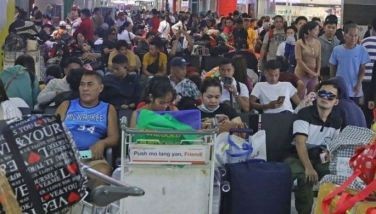Why the Commission on Human Rights failed
Proclamation No. 1081, was promulgated more than fifty years ago. It became notoriously known as the Martial Law declaration of former President Ferdinand Edralin Marcos. Only a remaining few of those belonging to the “Silent Generation” (born between 1928-1945) remember it while not many of us, “baby boomers” (born between the end of World War II and the mid-1960s) talkabout Marcos’ martial law. The people in the “generation x” (born 1965 and 1980) have vague memory of Proclamation No. 1081) and the “millennials” (born in the years 1981 thru 1996) have not experienced its atrocities. Of course, the youngest “generation z,” referring to peopleborn between 1996 and 2010 have no idea about the said military regime. More so with “generation alpha” (born between 2010 and 2024). It is understandable if they are not interested in what martial law was and how deadly was it enforced.
I was in my first year law school when the late President Marcos declared martial law, shut the gates of the Senate and the House of Representatives, closed the doors of newspapers, radio and television and let the armed forces, Philippine Constabulary and police patrol around the country.
I also remember of a brazen display of brutality shortly after Marcos began to allow few news media to operate. A Chinese named Lim Seng, declared as drug lord, was led out of a military stockade in Camp Crame and brought to a firing range in Fort Bonifacio where he was strapped to a wood pole and blindfolded. An officer, Lt. Jose Agawin barked the orders “Ready, Aim and Fire” that unleashed a volley of gunfire from eight M-1 rifles. In a split second, Lim Seng, was efficiently dispatched by seven .30-cal. bullets that ripped into his chest. Presumably, one rifle was loaded with blanks so that each member of the firing squad that day could assuage his conscience with the thought that he fired a dud. Honestly though, I did not know if there ever was a judicial decision finding the Chinese guilty as a drug lord. Government propaganda claimed that Lim Seng’s death spelled the end of the drug menace in the country.
Lim Seng’s case was described, later in our history, as among the thousand violent deaths and inexplicable disappearances. It became an irrepressible need to craft in our fundamental law provisions to protect human rights. The 1986 Constitutional Commissiondeclared the principle that the state values the dignity of every human person and guarantees full respect to human rights and proceeded to create the Commission on Human Rights (CHR) in the 1987 Constitution with the primary mandate to protect and promote the rights and dignity of every human being in the country.
Briefly, the CHR has, among its powers and functions, to Investigate, on its own or on complaint by any party, all forms of human rights violations involving civil and political rights and for that end to request the assistance of any department, bureau, office, or agency in the performance of its functions.
Early in the administration of former President Rodrigo Duterte, he announced his war against illegal drugs. In fact, during the 2016 campaign period, he promised to put an end to the narcotics trade within three months after being elected president. We all know that he miserably failed in his promise. The illegal drug trade proliferated in his regime even if, in the pursuit of his so-called war, there thousands of deaths, many of were described as extra judicial killings (EJK).
I imagined that the creation of the CHR in the presidency of CorazonC. Aquino was an effective tool against such human rights violations as the EJK. I imagined wrongly but onlylast Monday did I learn why.
The Senate Blue Ribbon subcommittee held a legislative investigation on EJK. The most damning declaration that we heard in that inquiry came from the head the CHR. That constitutional body could no perform its powers because of an administrative road block. Duterte signed on July 23, 2016, Executive Order No. 2 which the CHR testified in the hearing as the reason the police would refuse to give any documents involving the alleged killing of civilians by men in uniform. In short, Duterte himself, thru his EO 2, covered the blooded trail of the extra judicial killers.
- Latest
























